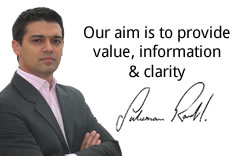What’s special about Self Managed Super Funds (SMSFs)?
Self Managed Super Fund’s (SMSF’s) main advantage is that they provides you with complete control over investments of the fund.
You decide what to invest into and you decide when to buy and sell.
Subject to legislation and your trust deed, you are able to invest in a wide range of assets through your fund. You can invest in:
- Shares
- Managed funds
- Property – both residential and commercial
- Unit trusts
- Cash
Reduced costs
Most retail Super funds and Industry funds charge a percentage of the members balance as their management fees. For example, a $500,000 retail Super fund with management fees of 2% would cost you $10,000 pa to run. At higher levels SMSFs can potentially be run at a much lower cost.
However, you should be aware that since SMSFs typically incorporate some aspect of flat annual fees, very small funds can also cost much more than a retail fund.
Add up the annual costs you pay within your fund, you may find your paying disproportionately high fees. Our relationship with SMSF administrators allows you to reduce the cost of your annual fees.
SMSF Insurance – Tax effective death benefits
Family members who are dependents for tax purposes may be able to obtain death benefit payments tax free (within limits) upon death of a member of a SMSF, thereby possibly providing a tax effective way of distributing assets.
SMSFs can be passed down from generation to generation
SMSFs benefit not only those who establish the fund during their lifetime, but also their children and future generations as it is passed on from generation to generation.
Transferring existing investments
SMSF’s are allowed to accept undeducted “in specie” contributions, allowing members to contribute shares, other listed securities and commercial real estate in lieu of cash. The benefit of this is twofold as mentioned above. Firstly, you can transfer certain income producing assets from a high tax environment (eg 46.5%) to a low tax bracket (15%). These assets are then potentially protected from creditors since it’s the SMSF trust that owns the assets.
